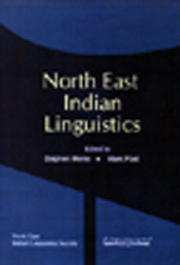Book contents
- Frontmatter
- Contents
- Introduction
- Foreword
- Phonology
- 1 Kurtöp Phonology in the Context of North East India
- 2 Working with Tones in North East India – The Tonal System of Numhpuk Singpho, Assam
- 3 Tonality and the Analysis of Sub-Minimal Words in Ao
- 4 Change with Continuity in the Boro-Garo Languages
- Lexicon
- Morphology, Syntax, and Semantics
- Language Description and Language Endangerment
3 - Tonality and the Analysis of Sub-Minimal Words in Ao
from Phonology
Published online by Cambridge University Press: 26 October 2011
- Frontmatter
- Contents
- Introduction
- Foreword
- Phonology
- 1 Kurtöp Phonology in the Context of North East India
- 2 Working with Tones in North East India – The Tonal System of Numhpuk Singpho, Assam
- 3 Tonality and the Analysis of Sub-Minimal Words in Ao
- 4 Change with Continuity in the Boro-Garo Languages
- Lexicon
- Morphology, Syntax, and Semantics
- Language Description and Language Endangerment
Summary
Introduction
Chungli and Mongsen are two of the three major dialects of the Ao language spoken by the Aos in Nagaland. These two labels refer both to the group as well as the dialect that they speak. The tradition of these groups has been oral and hence, most of the historical legends cannot be verified from written records. One such legend claims that the Chungli and the Mongsen were two separate groups initially. Clark (1911) notes that the Mongsen were overcome in a raid by the Chungli and had to submit to them by moving into their village. For long, they lived together but followed their own traditions and customs with clear geographical demarcations within the village. However, intermarriage brought these two groups together. At present, there are a few villages where these two groups live together occupying two different parts of the village while in some villages we see that one of the two no longer exists. However, there are villages which have been purely monolingual too. A rough estimate given by Coupe is that 50% of the Ao population speak Chungli while 40% speak Mongsen. The remaining 10% speak other Ao dialects.
Given the close proximity and language contact situation these two groups share, we attempt to look at these dialects from a comparative perspective. This paper aims to look at the phonological word in Chungli and Mongsen, more specifically at monosyllabic words which are past tense forms. It examines the conditions imposed on the minimal word in the two dialects by looking at the phonetic evidence available.
- Type
- Chapter
- Information
- North East Indian Linguistics , pp. 45 - 64Publisher: Foundation BooksPrint publication year: 2008

